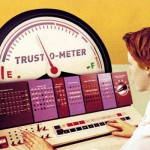 The way we perceive other people is often peculiar in its general irrationality. For instance, I wrote last year about a study that found how we generally prefer our leaders to look healthy rather than smart.
The way we perceive other people is often peculiar in its general irrationality. For instance, I wrote last year about a study that found how we generally prefer our leaders to look healthy rather than smart.
So what can we do with this knowledge? A second study, published in Personality and Social Psychology Bulletin, reveals the potential pitfalls that await us.
It found that when we alter our facial features, we can make ourselves look more trustworthy, but we can’t make ourselves appear more competent.
“Our findings show that facial cues conveying trustworthiness are malleable while facial cues conveying competence and ability are significantly less so,” the authors say. “The results suggest you can influence to an extent how trustworthy others perceive you to be in a facial photo, but perceptions of your competence or ability are considerably less able to be changed.”
A trustworthy face
The authors reveal that the facial features that influence trustworthiness are usually based on the dynamic musculature of the face, which they believe can be altered.
So a happy looking face is regarded as much more trustworthy than an angry looking face, even if our expressions aren’t overt.
Our perceptions of ability however are more likely to be drawn from the skeletal structure of the face, which is something that can’t be changed.
About the study
Participants in the study were shown a series of photos and computer generated images of adult males and asked to rate how trustworthy or capable they appeared to be.
It emerged that happier faces were regarded as more trustworthy, but perceptions of ability didn’t seem to differ, regardless of the ‘nature’ of each person.
This finding was replicated across three distinct experiments, including a third whereby participants were requested to answer two questions about each face they saw:
- which face would they choose to be their financial advisor? (designed to test trustworthiness)
- which would be most likely to win a weightlifting competition? (designed to test ability)
As before, people were more likely to choose happier seeming faces as their financial advisor, whereas the emotions of each face had no bearing on the choice of weighlifting champion.
Of course, we shouldn’t underestimate the importance of appearing trustworthy, especially in our socially driven age where trust is such an important currency to convey.
Going further
A third study explored the issue of trustworthiness in our facial features in more depth.
The research showed participants data on a fictional company before asking each of them to make a decision on whether the CEO should cut pay for all of the employees at the company by 15 percent to try and survive the recession they found themselves in.
Interestingly, it emerged that participants were easier in their judgement of the CEO when his biography included a photo of a person who had previously been rated as a highly trustworthy individual.
Prior to completing this task, each participant was asked if there were potentially other solutions to the financial crisis and whether any of these might have been fairer than the pay cut proposed by the CEO. It transpired that when the CEO was deemed fair, the participants were less likely to believe there to be any better alternative available.
This finding was replicated in a second experiment, which led the authors to believe that it was indeed the photo that was underpinning the faith people had in the CEO. It underlines the crucial role our gut instinct plays in how we perceive other people and indeed how seemingly unimportant things like the facial features of that person are critical to how those instincts are formed.
It’s particularly alarming as it could fulfil the so-called Pygmalion effect whereby our perceptions of someone strongly influences how that person subsequently performs. That was proved in a class environment when teachers were duped into thinking their pupils were high (or low) performers and their subsequent grades matched this perception, regardless of their aptitude prior to the experiment.
If we believe someone to be trustworthy therefore by virtue of their facial features, it’s likely to become self-fulfilling that this person will become trustworthy, in our own eyes at least.
It all reinforces how shallow some of our perceptions are, however, and certainly how unconscious they are. Despite our belief that we think and behave in a rational way, the evidence often suggests the exact opposite.
All I can say is – relax your face and stimulate your feelings. Reflect on the character you are trying to become and let that flow naturally to your expressions… ie.. don't think too hard on what you are trying to portray, but rather, actually become that person, live the character you want to portray.